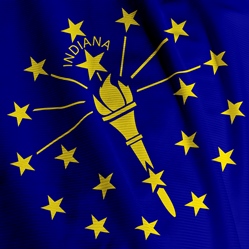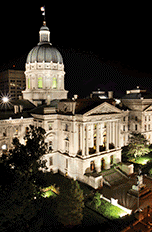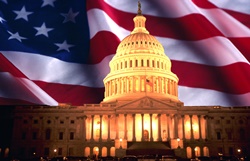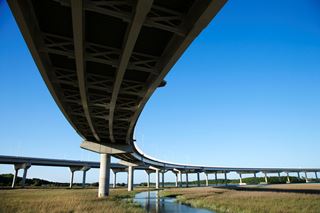 Several bills attempting to address Indiana’s transportation infrastructure and regional economic development are headed toward eleventh hour conference committee deliberations where differences in approach between House Republicans and Gov. Pence/Senate Republicans will need to be hashed out. It is a high-stakes game in an election year.
Several bills attempting to address Indiana’s transportation infrastructure and regional economic development are headed toward eleventh hour conference committee deliberations where differences in approach between House Republicans and Gov. Pence/Senate Republicans will need to be hashed out. It is a high-stakes game in an election year.
House Bill 1001 is the House Republicans’ original effort to create a long-term, sustainable and dedicated funding source for Indiana’s roads, highways and bridges. It attempts to address a near $1 billion annual maintenance shortfall through indexing existing fuel taxes to inflation, dedicating the sales tax on fuel sales to infrastructure (vs. the state’s general fund), increasing taxes on cigarettes to refill the state’s general fund coffers (which support the state’s Medicaid program), imposing fees on alternative fuel vehicles, and supplying local units of government with expanded fiscal tools and taxing authority for roads. The Indiana Chamber worked with legislators on this bill and supports this comprehensive, data-driven approach.
Senate Bills 67 and 333 (as they started in the Senate) reflect Gov. Pence’s and Senate Republicans’ desire to avoid any tax increases for roads this year and delay any major decisions on road funding until the 2017 budget year, while also giving some money and tools to local units of government. At best, these proposals are short-term fixes to a long-term problem and the Chamber prefers the House Republican legislation.
Add to this mix Gov. Pence’s request for an additional $42 million for a third Regional Cities grant award, and you have plenty of fodder for lengthy, contentious negotiations with a March 10 deadline looming. Leadership from both chambers has been meeting with the Governor and his staff to hammer out a compromise proposal. As of this writing, negotiations are occurring behind closed doors and in caucus discussions with both sides remaining far apart. Meanwhile, Democrats in the Legislature watch as Republicans battle among themselves over the “right” compromise package.
We anticipate that the third Regional Cities grant will be funded in some way and that some short-term road funds and expanded authority for local governments will emerge. Whether or not the tax increases in HB 1001 survive the negotiation is an open question. The Chamber will work with all parties to address the state’s road-funding needs in the most rational and comprehensive way possible.

 The political wrangling between the House and Senate over the roads bill is in full swing. This bill has been substantially altered by the Senate Appropriations Committee at the direction of its chairman, Sen. Luke Kenley (R-Noblesville). Essentially, Kenley’s amendment removes all tax increases and decreases from the bill and establishes a task force to further assess the state’s needs for road funding – putting off difficult decisions to 2017.
The political wrangling between the House and Senate over the roads bill is in full swing. This bill has been substantially altered by the Senate Appropriations Committee at the direction of its chairman, Sen. Luke Kenley (R-Noblesville). Essentially, Kenley’s amendment removes all tax increases and decreases from the bill and establishes a task force to further assess the state’s needs for road funding – putting off difficult decisions to 2017. SB 302 passed the Indiana Senate 35-15 on February 1, but House Speaker Brian Bosma (R-Indianapolis) stated this week that the measure won’t clear the House Ways and Means Committee “without extra help.”
SB 302 passed the Indiana Senate 35-15 on February 1, but House Speaker Brian Bosma (R-Indianapolis) stated this week that the measure won’t clear the House Ways and Means Committee “without extra help.” Election year dynamics, conservative Republican super majorities and the non-budget nature of the “short” session create the context for all issues facing the Indiana General Assembly in 2016. In economic development, the only issues to see much traction are adding LGBT civil rights protections to the Indiana Code and a short-term fix for the state’s roads and highways with an emphasis on local funding. Other issues will arise, but are unlikely to gain much attention.
Election year dynamics, conservative Republican super majorities and the non-budget nature of the “short” session create the context for all issues facing the Indiana General Assembly in 2016. In economic development, the only issues to see much traction are adding LGBT civil rights protections to the Indiana Code and a short-term fix for the state’s roads and highways with an emphasis on local funding. Other issues will arise, but are unlikely to gain much attention. The Indiana Chamber recently brought together a trio of the state’s top leadership on infrastructure issues to discuss Indiana’s current maintenance and funding challenges, including the closure of Interstate 65 near Lafayette due to emergency bridge repairs, and long-term solutions to an estimated $1 billion annual road and bridge maintenance funding gap.
The Indiana Chamber recently brought together a trio of the state’s top leadership on infrastructure issues to discuss Indiana’s current maintenance and funding challenges, including the closure of Interstate 65 near Lafayette due to emergency bridge repairs, and long-term solutions to an estimated $1 billion annual road and bridge maintenance funding gap. Don’t sit on the sidelines when you could be influencing laws and regulations under discussion in Washington. Make an impact by attending the Indiana Chamber’s D.C. Fly-in on September 16-17. (Note: Our hotel room block expires Sunday so book your reservations this week!)
Don’t sit on the sidelines when you could be influencing laws and regulations under discussion in Washington. Make an impact by attending the Indiana Chamber’s D.C. Fly-in on September 16-17. (Note: Our hotel room block expires Sunday so book your reservations this week!) The current federal funding stream for highways runs its course July 31. The Senate is looking at a four-year option, while the House appears more in favor of extending it through this year and soon revisiting the matter.
The current federal funding stream for highways runs its course July 31. The Senate is looking at a four-year option, while the House appears more in favor of extending it through this year and soon revisiting the matter.